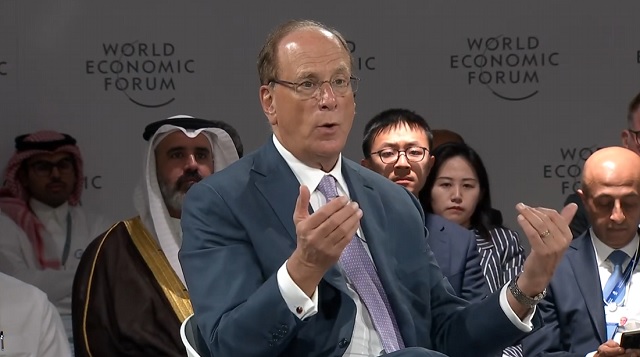Putin on Globalization, Bonehead Elites and the Ever-Shrinking Middle Class
from Russia Insider:

Globalization is one of the great issues of our time. The erasure of national borders, the weakening of sovereign governments and the impoverishment of workers across the developed world has triggered a massive populist backlash that threatens to roll back the economic-integration scheme that places Capital at the head of a new global order. Widespread social unrest, deepening political polarization, and the relentless rise of right-wing parties have put a damper on a process aimed at transforming the world into an unregulated free trade zone overseen by Central Bankers and corporate mandarins. The future of that project is now very much in doubt.
The basic problem with globalization is not hard to grasp. The giant corporations have outsourced millions of high-paying manufacturing jobs to low wage platforms across Asia leaving behind thousands of shuttered factories and broken communities, a sharp spike in opiate addiction, and the steady erosion of living standards. Author Paul Craig Roberts predicted Globalization’s devastating fallout 15 years ago in a series of articles at Counterpunch. Here’s an excerpt from one of those articles:
“Corporations offshored or outsourced abroad their manufacturing output, thus divorcing American incomes from the production of the goods that they consume. The next step in the process took advantage of the high speed Internet to move professional service jobs, such as engineering, abroad. The third step was to replace the remains of the domestic work force with foreigners brought in at one-third the salary on H-1B, L-1, and other work visas.
This process by which financial capital destroyed the job prospects of Americans was covered up by “free market” economists, who received grants from offshoring firms in exchange for propaganda that Americans would benefit from a “New Economy” based on financial services, and by shills in the education business, who justified work visas for foreigners on the basis of the lie that America produces a shortage of engineers and scientists….
The immiseration of working people has not resulted from worsening crises of over-production of goods and services, but from financial capital’s power to force the relocation of production for domestic markets to foreign shores. Wall Street’s pressures, including pressures from takeovers, forced American manufacturing firms to “increase shareholders’ earnings.” This was done by substituting cheap foreign labor for American labor.” (“Marx and Lenin Reconsidered” Paul Craig Roberts, Counterpunch)
In 2016, Trump’s hard-line anti-trade bombast buoyed him into the White House. Unfortunately, his actions have not matched his rhetoric. Trump sparked a furor with his trade war with China, but the gains have been minimal at best. Trump’s supporters believed he would boost tariffs and bring manufacturing jobs back to the US, but that hasn’t happened and probably won’t. In truth, Trump’s trade war isn’t really aimed at helping the little guy, it’s designed to discourage forced technology transfers and intellectual property theft. It’s a gift to Silicon Valley not working people. Trump also promised to renegotiate NAFTA which he called a “nightmare” and which led to massive job losses in the US. But the new agreement makes only superficial changes to the bill that are unlikely to increase employment in the US. Here’s how the Wall Street Journal summed it up:
“Not-So-New Nafta— At its core, U.S.-Mexico-Canada Agreement, or USMCA is an amended, rebranded version of the North American Free Trade Agreement, which took effect in 1994, along with some newer provisions that the Obama administration had negotiated in a Pacific trade pact that Mr. Trump exited. Both USMCA and Nafta essentially guarantee duty-free trade and economic integration in North America….
The bipartisan U.S. International Trade Commission said the deal will produce a tiny gain in the U.S. Gross Domestic Product—a boost of 0.35% total over the long term—in large part because USMCA removes trade-policy uncertainty for key industries.” (“USMCA: The Deal’s Been Signed, but the Debate Continue” Wall Street Journal)
Trump’s rewriting of NAFTA is a card trick meant to fool his supporters, it’s not a serious attempt at preventing job-flight. Nor has Trump changed the government’s position on globalization, in fact, he’s intensified it. Just look at the way the administration has bullied Germany about buying gas from Russia (Nordstream), or how the Huawei executive was arrested in Vancouver, or how countries have been slammed with unilateral sanctions that are clearly forbidden under WTO rules. Wherever you look, Washington is using more coercive means to impose its own economic model on the rest of the world. The problem is not the “free market” per say, but a model of economic integration that favors a small group of western corporations who reap an unfair share of the benefits and who want to maintain absolute control over the levers of power. This is why globalization is experiencing such widespread rejection, because the rewards have mainly gone to the upper 1 percent of the population while everyone else gets table scraps. Russian president Vladimir Putin, who has spent a fair amount of time analyzing western-style globalization, had this to say:
“Has anyone ever given a thought to who actually benefited and what benefits were gained from globalization, the development of which we have been observing and participating in over the past 25 years? China has made use of globalization to pull millions of Chinese out of poverty…. In the United States, the leading US companies, their managers, shareholders and partners – made use of these benefits. (But) The middle class in the United States has not benefited from globalization. It was left out when this pie was divided up.”
Putin makes a good point, but it’s a point that is mainly shrugged off in the mainstream media where the noxious downside of globalization is avoided like the plague. The media has effectively banned any public discussion of a critical topic that is now driving our politics and fueling the rise of far-right populism. Fortunately, the blackout has done nothing to blunt the growing public unease with a system that has inflicted severe damage on the nation. Here’s Putin again:
“It seems like elites don’t see the deepening stratification in society and the erosion of the middle class…(but the situation) creates a climate of uncertainty that has a direct impact on the public mood. Sociological studies conducted around the world show that people in different countries and on different continents tend to see the future as murky and bleak. This is sad. The future does not entice them, but frightens them. At the same time, people see no real opportunities or means for changing anything, influencing events and shaping policy. As for the claim that the fringe and populists have defeated the sensible, sober and responsible minority – we are not talking about populists or anything like that but about ordinary people, ordinary citizens who are losing trust in the ruling class. That is the problem….”
Putin is right. Recent surveys show that confidence in democracy and public institutions has never been lower. Also, most older people now accept that standards of living will continue to drop and that their children will face a bleaker reality than they did. All this has added to the growing sense of desperation that has gripped large parts of the country and which expresses itself in feelings of powerlessness, hyper-nationalism, and seething resentment towards immigrants. Putin again:
“People sense an ever-growing gap between their interests and the elite’s vision of the only correct course, a course the elite itself chooses. The result is that referendums and elections increasingly often create surprises for the authorities. People do not vote as the official and respectable media outlets advised them to, nor as the mainstream parties advised them to. Public movements that only recently were too far left or too far right are taking center stage and pushing the political heavyweights aside.”
Right again. Trump ran against 7 career GOP politicians any one of who might have beaten him in normal times. But after 7 years of Obama’s fake recovery, many voters started to reject traditional politicians and turned to more extreme candidates, like Trump. Hillary faced the same anti-establishment furor. Millions of Democrats flipped sides and voted for Trump not because they didn’t notice his glaring shortcomings but because their wretched financial situation required a more radical remedy. Here’s Putin again:
Read More @ Russia-Insider.com
Loading...



